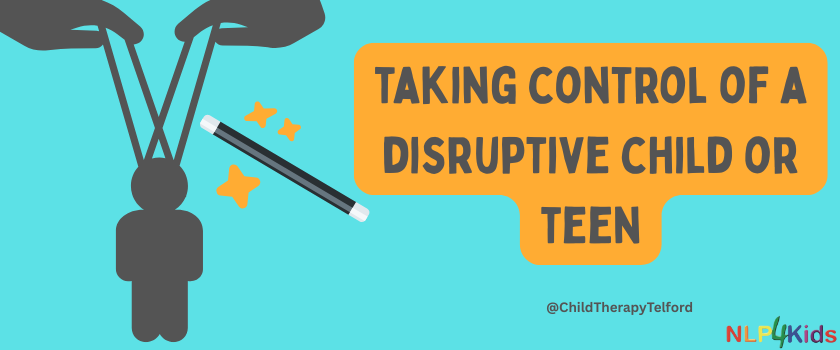Taking Control of a Disruptive Childs Behaviour

Taking control of a disruptive child, although it may sound a bit intense, the concept of “taking control” of a difficult young person strikes a chord with many parent,s especially if you are desperate! However, it’s essential to clarify that true control over another person, including children, is an illusion. Instead, the focus should be on influencing behaviour positively and fostering a supportive environment where both parties can thrive.
Understanding the Dynamics of Influence
As parents and caregivers, you’re likely familiar with the concept of rewarding desired behaviour while minimising attention to undesired actions. This approach can be effective, but it comes with its challenges. Here are three critical considerations to help navigate these dynamics.
1. Approach Each Interaction with a Fresh Perspective
One significant challenge is maintaining a neutral attitude during interactions with your child. It’s vital to approach each encounter as a “clean slate.” If you carry frustrations or negative feelings from previous encounters, those emotions can inadvertently seep into your interactions. This negativity may prevent your child from responding positively. Research suggests that parental emotions play a crucial role in a child’s emotional development. According to a study published in the Journal of Child Psychology and Psychiatry, children are highly attuned to their parents’ emotional states, which can impact their own behaviour and anxiety levels. Therefore, fostering a calm and positive atmosphere can significantly influence how your child reacts. (I understand that it’s easier said than done, but please trust me on this!)
2. The Balance of Attention
Another common misconception is that parents should praise positive behaviour while ignoring negative actions completely. While acknowledging good behaviour is essential, entirely dismissing negative behaviour can be risky. Instead, it’s important to manage the energy you give to both.
For instance, if a teenager responds with anger, such as slamming doors, it’s crucial to address the behaviour without escalating the situation. Responding with calmness and clarity can help de-escalate tension. Research from the American Psychological Association highlights that conflict management strategies, including calm communication, can reduce anxiety and improve family dynamics.
3. Recognising and Reinforcing Positives
When entrenched in a cycle of unwanted behaviour, it can be challenging to notice the positives. Start small by recognising even the most mundane achievements. For example, if your teenager completes their homework independently, acknowledge it with specific praise: “I appreciate how you handled your homework without reminders.”
This practice not only encourages more of the desired behaviour but also trains you to identify and celebrate positive actions. A study by the University of Cambridge found that positive reinforcement can significantly improve behaviour in adolescents, leading to greater emotional stability.
The Role of Anxiety in Teen Behaviour
Anxiety is a prevalent issue among teenagers today, particularly in a fast-paced environment. According to the Mental Health Foundation, one in six young people experiences anxiety, which can manifest as anger or withdrawal (Mental Health Foundation, 2023). Understanding this can help parents frame their responses more effectively.
When a teenager reacts negatively, consider that underlying anxiety may be at play. By addressing their feelings and providing a supportive environment, you can help reduce their anxiety and encourage healthier interactions.
Positive Influence:
• Fresh Perspectives: Approaching interactions without past baggage can foster better communication.
• Balanced Attention: Acknowledging both positive and negative behaviours appropriately can lead to healthier dynamics.
• Recognising Small Wins: Celebrating minor achievements encourages positive behaviour and enhances emotional awareness.
Overemphasis on Control:
• Illusion of Control: Attempting to control a child can lead to resistance and further challenges.
• Emotional Impact: Negative emotions can hinder effective communication and increase anxiety in children.
• Ignoring Negative Behaviour: Completely dismissing unwanted behaviour may inadvertently reinforce it.
While parenting can be challenging, particularly in managing anxiety and behaviour, adopting a thoughtful, supportive approach can lead to more positive outcomes. By actively engaging with your child and fostering an environment of understanding, you can help them steer the complexities of adolescence with greater ease and confidence.
Child Therapy Telford “Empowering Parents in Telford: Transforming Teen Behaviour Through Understanding and Support
Book a FREE consultation with Child Therapy Telford.
https://louisa-nlp4kids.youcanbook.me
https://childtherapytelford.nlp4kids.org
 07966 819194
07966 819194
 louisa@nlp4kids.org
louisa@nlp4kids.org
The original version of this article was written by Gemma Bailey, director of www.NLP4Kids.org. It was republished and rebuilt with additional content by Louisa Gauld-Crichton – Child Therapy Telford. https://childtherapytelford.nlp4kids.org
Leave a comment
This site uses Akismet to reduce spam. Learn how your comment data is processed.

Leave a Reply